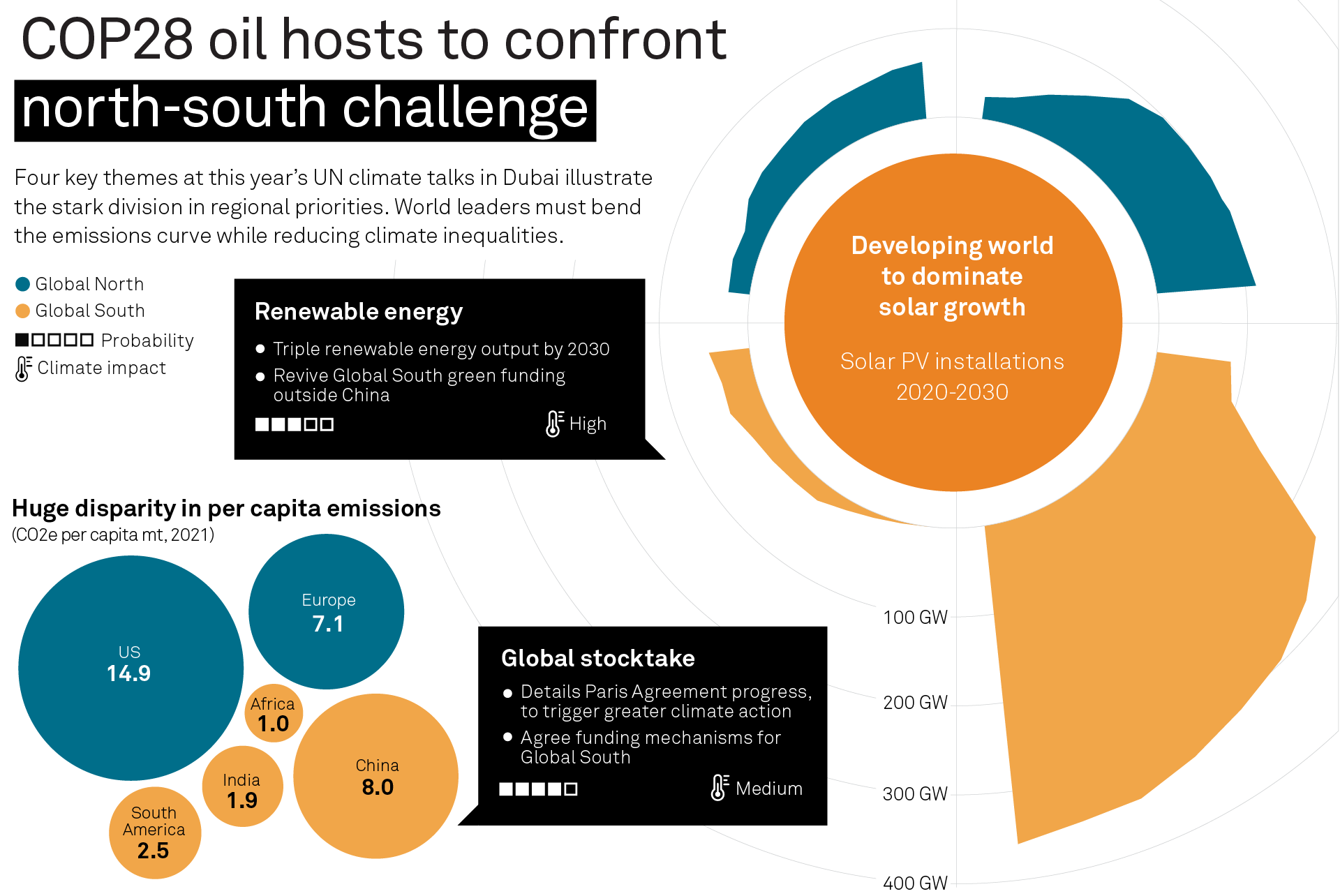COP 28: Trailblazer or COP Out?
December 16, 2023 | Expert Insights

In an unprecedented climate deal, almost 200 countries agreed to a decision calling on nations to transition away from fossil fuels at COP 28. Held in Dubai, the summit witnessed two weeks of negotiations fraught with differences. When COP 28 president Sultan Al Jaber slammed the gavel to pass the final decision, the delegates gave an ovation, and the UN climate chief hugged him.
Some hail the decision as historic, optimistically opining that it marks the beginning of the end of fossil fuels. Others point out that it's full of loopholes that give credence to fossil fuels, and it doesn't adequately support climate adaptation for those most vulnerable to climate change and energy transition for developing countries.
Background
Despite exhortations from more than 130 countries, scientists, and civil society groups, the agreement did not explicitly commit to phasing out or phasing down fossil fuels.
However, it did call on countries to contribute to world efforts to transition away from fossil fuels and accelerate action to reach net zero by 2050. This was despite efforts by Saudi Arabia to remove any reference to fossil fuels.
This is the first time that a COP agreement has called on countries to turn away from fossil fuels. However, critics and global south countries pointed out that it failed to make provisions to help the most vulnerable cope with climate change impacts like extreme weather and heat. It also contained language that condoned fossil fuel interests.

Analysis
While the COP 28 deal may not help the globe maintain the 1.5 degrees C limit (even though it reinforced the goal), it is still a landmark in that it calls on countries to transition away from coal, oil, and gas. Many interpret this as signalling the beginning of the end of the fossil fuel economy.
The deal also called for tripling global renewable energy and doubling the rate of energy efficiency improvements by 2030. While it recognised the need for major emission cuts, it remains to be seen whether this will be reflected in countries' targets and policies they submit in their new commitments in 2025. Some countries (including China) objected to a statement that emissions should peak by 2025, so it was dropped.
A key criticism of the deal was that its language was conducive to fossil fuel continuance. It referred to the role of "transitional fuels", which effectively translates to natural gas or methane, contributing to global heating. It also accommodated carbon capture, utilisation, and storage. Many criticise this as enabling fossil fuel producers to continue on the pretext that carbon will be captured. Not only does it give a license to fossil fuel continuance, but it is also a distraction from policies to cut fossil fuel use. While carbon capture and storage technologies (to remove carbon pollution from the atmosphere) may play a limited role in certain industries, they remain expensive and unproven at scale.
The deal also offered little on climate adaptation and finance, though it acknowledges that it requires trillions of dollars worth of support. However, on the summit's first day, a loss and damage fund (a result of years of negotiations) was set up to help vulnerable countries repair climate breakdown.
Each country is responsible for delivering through its domestic policies in the aftermath of the deal. On a different note, the U.S. pledged to cut methane pollution in its oil and gas industry by almost 80 per cent by 2038. Fifty leading oil and gas companies, including Exxon and Saudi Aramco, pledged to cut methane intensity by 80-90 per cent by 2030. Yet, even while the COP deal calls for transitioning and fossil fuels are being phased away, new fields are being exploited.
The agreement's call for phasing out "inefficient fossil fuel subsidies" is also a first in that it identifies the role of fossil fuel subsidies in climate change. However, "inefficient" is a loophole that legitimises the use of LNG (liquefied natural gas) even though it may be as bad or worse than coal due to methane leaks. Incidentally, the U.S. is looking at a massive LNG expansion.
The COP 28 decision may not immediately affect the petroleum market. However, it does send a message to global markets and could lead to incremental policy and investment decisions that result in a shift in direction over time.
Assessment
- The COP 28 deal is a significant milestone and a landmark climate agreement that explicitly calls on nations to move away from fossil fuels and calls out fossil fuel subsidies, albeit with loopholes.
- The loss and damage fund operationalised for vulnerable countries to mitigate climate damage is also a substantial contribution. However, the lack of additional financing to help developing nations meet the sizable costs of energy transition is a gaping lacuna in this deal.
- The mild language and “litany of loopholes” could prove to be an enabler for fossil fuel continuance at a critical time. It leads to the question of whether the time for “transitional fuels” is past and whether it is the time to actively switch to renewables.








Comments